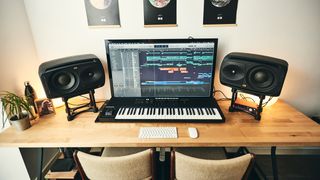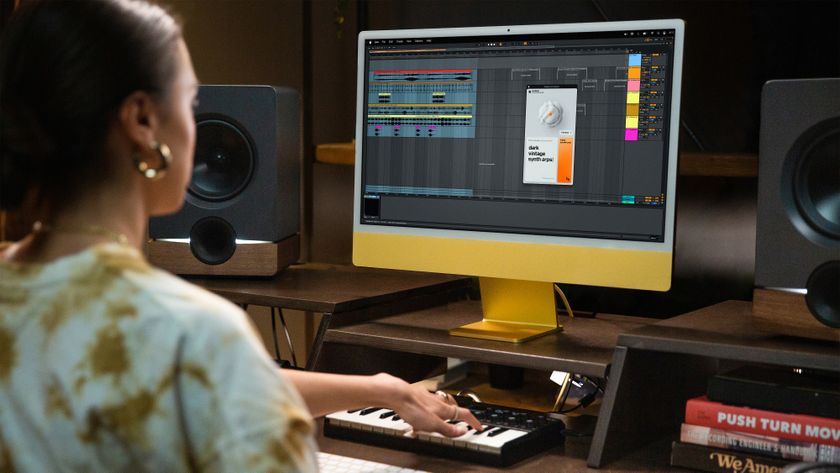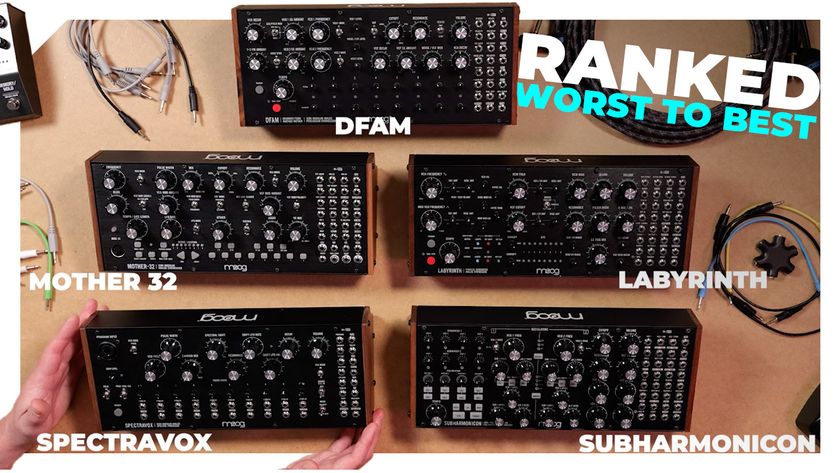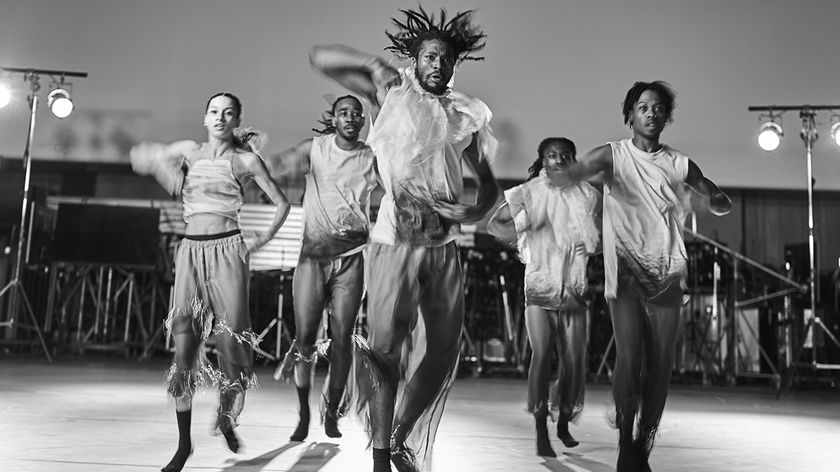Producer Masterclass - Ivy Lab: “These days, the average plugin sometimes feels a bit over the top”
The duo dissect a track on video and explain their unique music production philosophy
MTS 2020: The more we slice and dice electronic music into genres and sub-genres, the harder it gets to describe a ‘sound’. These days, music is free to venture down newly-built motorways, ancient side roads and obscure dirt-tracks, constantly cross-referencing and reinventing itself at will.
What’s wrong with that? Not much, really. The more the merrier and all that. But it does cause a few problems when you’re interviewing Ivy Lab. In the days leading up to our pre-Covid visit to their East London studio, we found ourselves struggling to keep count of the names/labels that they’ve been allocated. Electronic hip-hop, future beats, drum ‘n’ bass, halftime drum ‘n’ bass, UK beat, halftime hip=hop, liquid jungle, space beats, interplanetary hip-hop, thoughtful bass music, cosmic beats… we stopped counting at around the 20-25 mark.
Gove Kidao - one half of Ivy Lab and director of their label, 20/20 LDN 0 - can’t help but smile when we tell him about the pigeonhole dilemma.
“There was a time when it seemed as if we were collecting them like medals. There is still that need to give music a name, but we’re getting to a point where some of those names aren’t particularly useful. What do they mean?”
“I find that the more specific a label or a genre is, the less meaning it has,” adds Ivy Lab partner, J Fogel. “Whereas the old school general labels - techno, hip-hop, house - still mean something to me. They’re useful. They serve a purpose. If you’re advertising an event or a label and you say ‘drum ‘n’ bass’, it gives people an idea of what they’re going to get. It’s the same with music reviews. OK, there are loads of different sub-genres of drum and bass, but at least it points people in the right direction.
“Once you start cutting everything up into tiny slices, the meaning starts to disappear. You’ve also got the problem of… well, the more specific you are, the more you run the risk of backing yourself into a very small corner. You’re in danger of closing off certain areas of music that you might otherwise be interested in.”
Gove continues the theme. “I guess that one of the main stumbling blocks when it comes to describing what we do is that we have had two very distinct incarnations. We started out as fairly left-of-centre drum ‘n’ bass, and we thought we could seamlessly move from that to electronic instrumental hip-hop. In our minds, it all made complete sense. It was self-explanatory. We made drum ‘n’ bass, then drum ‘n’ bass with hip-hop beats. There was a natural connection between the two. Unfortunately, not everybody saw it like that.
Get the MusicRadar Newsletter
Want all the hottest music and gear news, reviews, deals, features and more, direct to your inbox? Sign up here.
“All of a sudden, people were coming up with these new labels to describe the music we were making. Other people were having arguments and discussions about Ivy Lab and that caused us to have our own internal discussions. Some of the new labels were embraced, but some didn’t feel right.
“At the end of the day, it’s not something we can control. People will call our music whatever the hell they want to call it. As long as they’re enjoying it and they give it a fair hearing, I’m OK with that.”
The Ivy Lab story actually starts 10 or 11 years ago. Gove (aka Sabre) and former Ivy Lab member, Laurence Reading (aka Halogenix), were introduced via their brothers. Reading, meanwhile, had sent some demos to J Fogel (aka Stray) who was beginning to make his name with a few choice drum ‘n’ bass releases for Critical Music. Eventually, the three of them found themselves in the same studio and Ivy Lab was born.
Gove is a few years older than both J and former member Reading, and wasn’t sure if the trio idea was going to work. Any reservations were soon swept aside with the 2012 release of Oblique.
Credited to Sabre, Stray and Halogenix, with vocals by Frank Carter III, Oblique was a genuine drum ‘n’ bass anthem… urgent, soulful and ever-so-slightly unsettling.

“Studio-wise, the setup wasn’t too different to what we’re working on now,” explains J. “Oblique was made on Logic in a bedroom studio. The real difference was that there were three of us and, for a lot of that early period, we were all based in different places. I was at uni in Leeds, Gove had moved to Thailand and Laurence was in London. The music was put together by email!”
“Laurence and J were beginning to get established as artists in their own right and I’d had a couple of releases, too,” says Gove. “But, musically, I was all messed up. I felt like I was at a crossroads and wasn’t sure where to go. I’d been over in the leftfield, but the stuff I was making started to sound ‘too’ leftfield. I was trying too hard and wanted to find something that felt a bit more… honest. Once we all started working together, I knew it was right.”
As Gove mentioned earlier, Ivy Lab’s musical starting point was drum ‘n’ bass. But even if you go back to 2015 and tracks like Sunday Crunk or Taste The Mango, you can already hear that there are other grooves vying for attention. By 2017’s Peninsula EP, the drum ‘n’ bass blueprint was getting seriously mangled. Slower beats, a psychedelic sound palette and some well-wonky melodies.
Eventually, Halogenix - the acknowledged drum ‘n’ bass champion of the trio - went solo, allowing Gove and J to start pushing things further into the outer limits of their disconcerting sonic stratosphere.
“There’s definitely a weird sci-fi theme that runs through a lot of our music,” laughs J. “We are naturally drawn to extra terrestrial sounds. Horror movies, too. Not the blood and gore stuff. Kooky B-movie horror and kooky B-movie sci-fi. That’s where we get a lot of our samples from. And library music too… the genius of KPM or Cavendish.”
“Even in the drum ‘n’ bass days, I always felt you could hear that coming through,” explains Gove. “It has always been part of who we are and part of the music. Drum ‘n’ bass was birthed as a sample-based music and hip-hop was birthed as a sample-based music. The difference is that the hip hop guys went to James Brown, Al Green and The Meters, and we went to unknown B-movies. We were after dark, uneasy sounds. Even when we made uplifting music, there always seemed to be this undercurrent of darkness.”
“People often say that music is there to depict certain human emotions and I think that’s true,” says J. “It can depict very tangible human emotions like happiness, sadness, fear or loss. And I’d like to think that we don’t shy away from that. We’re not afraid to make emotional music. But the emotions that we’re interested in are the odd ones… otherness, a sense of mystery. Something that is engaging because it has a lack of proximity to the average day-to-day grind. It’s music to take you somewhere else.
“And the sound palette we use for that comes from somewhere else, too. Alien life forms, space, a futuristic drum groove or a certain wonky melodic cadence. I dunno… maybe some people would struggle to say what our music makes them feel. There’s tension in the music, definitely. And I’d like to think that we can catch people off guard. They listen to certain Ivy Lab sounds and think, ‘What the fuck is that?’”
Somebody described it as the soundtrack to the Tim Robbins movie, Jacob’s Ladder?
“That was me,” admits Gove. “That’s the kind of horror I’m talking about. Not vampires and monsters. Just the nagging feeling that something is not right. You watch TV and think the world’s going crazy. Every day, there’s a creeping sense of unease.”
But at the same time, there’s also a lot of humour in Ivy Lab’s music. It’s pretty much impossible to listen to Astral Pirate Theme (from the 2018 album, Death Don’t Always Taste Good) without smiling.
“I agree. That is a really silly song,” says Gove. “Where does that come from? Well, what I’d say is that with all those old movies, there is also a sense of humour. It’s tongue-in-cheek. It’s cheesy and corny. Cheap and tacky. Tension and humour existing side by side.
“When you’re making electronic music - or maybe any kind of music - it’s very easy to drift into the pretentious arena. Everything has to be serious and po-faced. And we’ve been as guilty of that as anybody. You can easily get lost amongst the technology and your pretentious ideas. But the fact that we have been there means we have also earned the right to be silly. To have a laugh. It’s not our USP, but every now and then, it’s nice to just let go. To embrace the humour and madness that so often exists alongside the darkness.”
Despite the otherworldly sounds that are created in the Ivy Lab studio, it’s a fairly basic setup, as you’ll see from the video - just a small spare room with a bit of DIY acoustic treatment.
“We have talked about going down the hardware route,” says J. “I like the idea of analogue synths… that physical thing of adjusting the controls. But where would we put it? The answer would probably be renting something or going to one of those studios like Devon Analogue and spending a couple of days just harvesting sounds.”
“I was a bit more of a hardware producer when I first started,” explains Gove. “I had the Novation Supernova synth, the Roland JV-1080 sound module and an E-MU sampler that I had no idea how to use. But as soon as things started moving onboard, I jumped straight in there. It’s always fashionable to talk about the beauty of analogue, but I wasn’t a big fan. I found it a lot easier to get my head around digital gear and then I actually became a lot more productive.
“Synth-wise, the main ones for us are a bit of Omnisphere, Trilian, a bit of Massive, FM8 and the Logic synth, Alchemy. I love the simplicity of Alchemy… well, what it does is quite complicated, but the way it does it is very simple, and the layout is pretty straightforward. Most of our sound-sculpting comes from the [Logic sampler] EXS24. Taking a piece of sound that’s ‘this long’ and making it ‘this long’. Or using the EXS to give plugin synths a bit more of an old school feel.
“The EXS works like an Akai. As you go up the keyboard, your sampled sound speeds up. So, if you get a modern synth sound and play it from the EXS, you can give it different qualities. You can make it sound more MPC. More hip-hop. More hardcore.”
“We did something the other day with a particular sound from Omnisphere,” says J. “When we played it from the synth, it immediately had synth qualities. The way a note or phrase bleeds over into the next one. Why not bounce it into the EXS, chop off the release and the reverb, then find a few interesting notes up and down the keyboard. You immediately get that old Akai/E-MU sound. I’m not saying that we’re master sound-shapers on the EXS. In fact, we tend to keep things very basic. That’s why we like working in the EXS, because it’s got limited editing facilities.”
“These days, the average plugin sometimes feels a bit over the top,” reckons Gove. “You’ve got a thousand editing options, but where do you actually start? We seem to work better with limited sculpting/editing power. Fewer knobs to tweak means that you can get on with the job of composing. What’s the point of having all these options if they’re just crowding out your headspace? Get what you’re after, make it sound good, find out where it fits and move on to the next job!”
“We are definitely not noodly producers,” laughs J.
Some people would probably disagree with that. There was plenty going on while we were filming. It’s not just kick, bassline, couple of hooks and away we go.

“How would we describe our production style?” asks Gove. “We’ve recently been working with Amon Tobin [aka Two Fingers] and we’ve been really happy with how things have turned out. You know Amon Tobin… stylistically, he’s got a lot going on in his music. It’s harmonically rich and complex. J has been going over to LA for these recording sessions and coming back with some incredible stems. I dread to think how much stuff is in there that doesn’t actually make it onto the final track. But that’s the essence of what we do. We find the best four things and work with them. Don’t mourn the loss of something that didn’t make it to the finish line. If you’ve got the best bits, you’re working with maximum effectiveness.
“Start getting into slight variations and you’re going to lose the earworm. Take a bit more and a bit more, and you’re suddenly in the realms of super-complexity. We don’t go down that route.”
Simplicity may be the key to an Ivy Lab production, but that doesn’t mean that their music doesn’t catch you unawares. One word that came up constantly during the day we spent with Gove and J was ‘wonky’. Take a listen to a track like Zip It or Suburbia from their Space War EP and you’ll understand why. The off-centre swing seems to be in constant danger of falling over itself, but always manages to pull itself back into line. Just about!
We tend to do most of the wonkiness by hand. You could get a plugin to do it, but that just doesn’t feel right.
“We tend to do most of the wonkiness by hand,” says J. “You could get a plugin to do it, but that just doesn’t feel right. I’ve always been a fan of Squarepusher and I kind of use him as a template. Yes, he goes right to the extreme when it comes to programming, but he always seems to keep that feeling of… this is human music, it’s not machine music. We’ve had lots of discussions about what works and what doesn’t work, but there are no hard and fast rules with going wonky. It’s all very subjective and tied up with what feels good.”
“At first, when we started to explore off-grid rhythms, it was more of an incidental part of the music,” says Gove. “But, as time went on, it became part of the core aesthetic. Yes, there are times when it can be distracting, but it’s become as much a part of the compositional process as a certain instrument or a particular melody.”
“I think that’s one of the benefits of working with someone else,” says J. “If you disappear too far down a personal way of working in the studio, you can end up alienating anyone who hasn’t gone through the exact same musical education as you. When there’s two, you’ve got that automatic safety valve. If you go too far with the wonkiness or the weird noises, there’s always somebody there to say, ‘What the fuck are you playing at?’”
This Producer Masterclass originally appeared in Computer Music 279 (March 2020)


Computer Music magazine is the world’s best selling publication dedicated solely to making great music with your Mac or PC computer. Each issue it brings its lucky readers the best in cutting-edge tutorials, need-to-know, expert software reviews and even all the tools you actually need to make great music today, courtesy of our legendary CM Plugin Suite.













